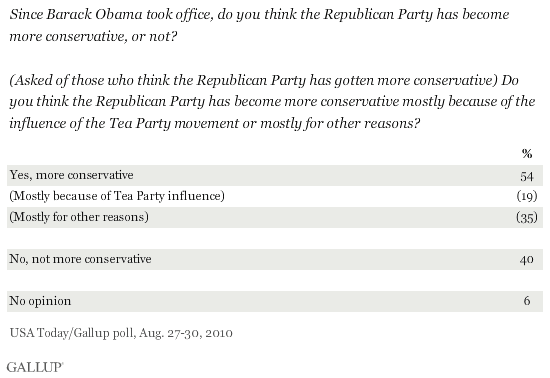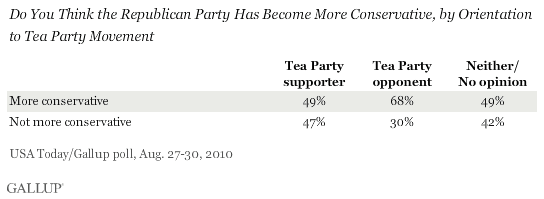PRINCETON, NJ -- The prevailing view among Americans is that the Republican Party has become more conservative since Barack Obama took office, but not necessarily because of the Tea Party movement's influence. Among the 54% who say so, about a third -- representing 19% of all Americans -- think the Tea Party movement is the primary reason for this; the rest believe other factors are at work.

The Tea Party has clearly affected Republican politics this year, with candidates backed by Tea Party activists defeating several incumbents or establishment figures in Republican U.S. Senate nominating contests. The Aug. 27-30 poll was conducted before the most recent Tea Party win in the Delaware Senate primary on Tuesday, but after earlier wins for the movement in GOP Senate primaries and conventions in states such as Alaska, Kentucky, Utah, and Florida.
The poll finds 30% of Americans identifying themselves as supporters of the Tea Party movement and 27% as opponents, with the remainder neutral or not having an opinion, consistent with what Gallup has found in four separate polls this year.
Those who describe themselves as Tea Party "opponents" widely believe the Republican Party has become more conservative, while those who say they are Tea Party "supporters" are closely divided in their views of whether a shift has occurred.

In contrast, views on the Republican Party's ideology are similar among the three traditional party groups -- 59% of Democrats, 56% of Republicans, and 50% of independents believe the GOP has become more conservative since Obama took office.
Americans who believe the Republican Party has become more conservative are divided in their opinions of whether that is a "good thing" (50%) or a "bad thing" (48%). Predictably, conservatives and Republicans generally believe the perceived GOP shift is a good thing, and liberals and Democrats take the opposite view.
Bottom Line
Key indicators of the 2010 political environment, including the generic congressional ballot, indicate that the Republican Party is politically well-positioned heading into this fall's midterm elections. This may be partly because Americans tend to disapprove of most of the major legislation passed under Obama and the Democratic Congress now in power. However, one possible weakness for the Republican Party during the fall campaign could be the perception that the party has become more conservative. Americans may be frustrated with the Democrats' performance, but if the Democratic Party can convince voters that the Republican candidates are too extreme, it may be able to hold on to its majorities in the House and Senate.
Results for this USA Today/Gallup poll are based on telephone interviews conducted Aug. 27-30, 2010, with a random sample of 1,021 adults, aged 18 and older, living in the continental U.S., selected using random-digit-dial sampling.
For results based on the total sample of national adults, one can say with 95% confidence that the maximum margin of sampling error is ±4 percentage points.
Interviews are conducted with respondents on landline telephones (for respondents with a landline telephone) and cellular phones (for respondents who are cell phone-only). Each sample includes a minimum quota of 150 cell phone-only respondents and 850 landline respondents, with additional minimum quotas among landline respondents for gender within region. Landline respondents are chosen at random within each household on the basis of which member had the most recent birthday.
Samples are weighted by gender, age, race, education, region, and phone lines. Demographic weighting targets are based on the March 2009 Current Population Survey figures for the aged 18 and older non-institutionalized population living in continental U.S. telephone households. All reported margins of sampling error include the computed design effects for weighting and sample design.
In addition to sampling error, question wording and practical difficulties in conducting surveys can introduce error or bias into the findings of public opinion polls.
View methodology, full question results, and trend data.
For more details on Gallup's polling methodology, visit https://www.gallup.com/.
